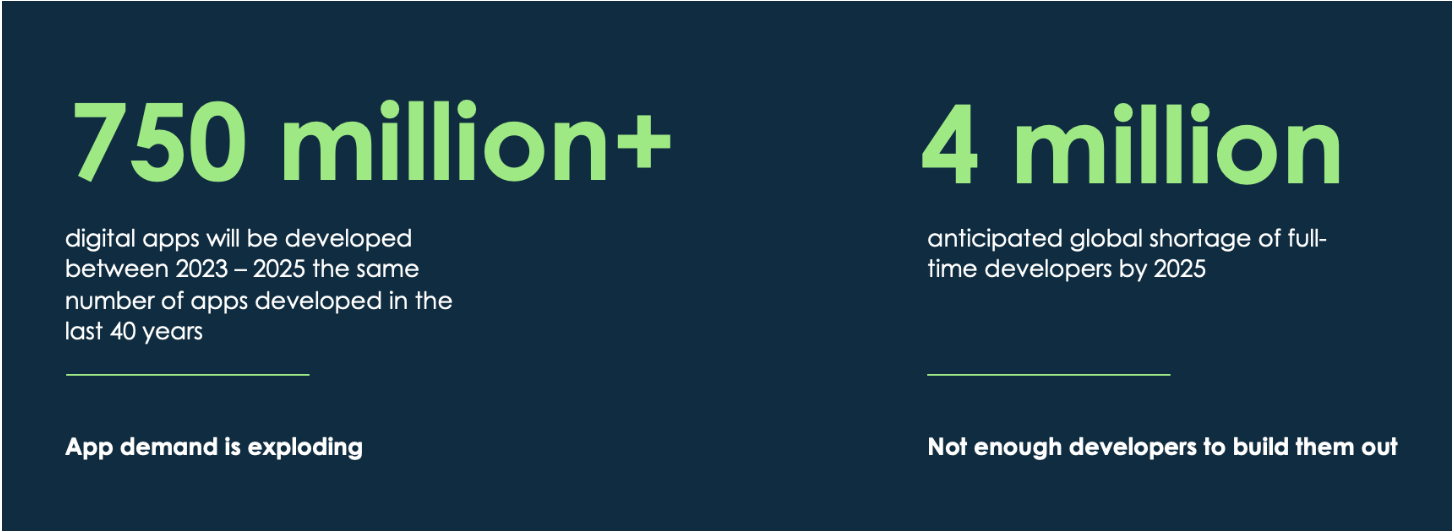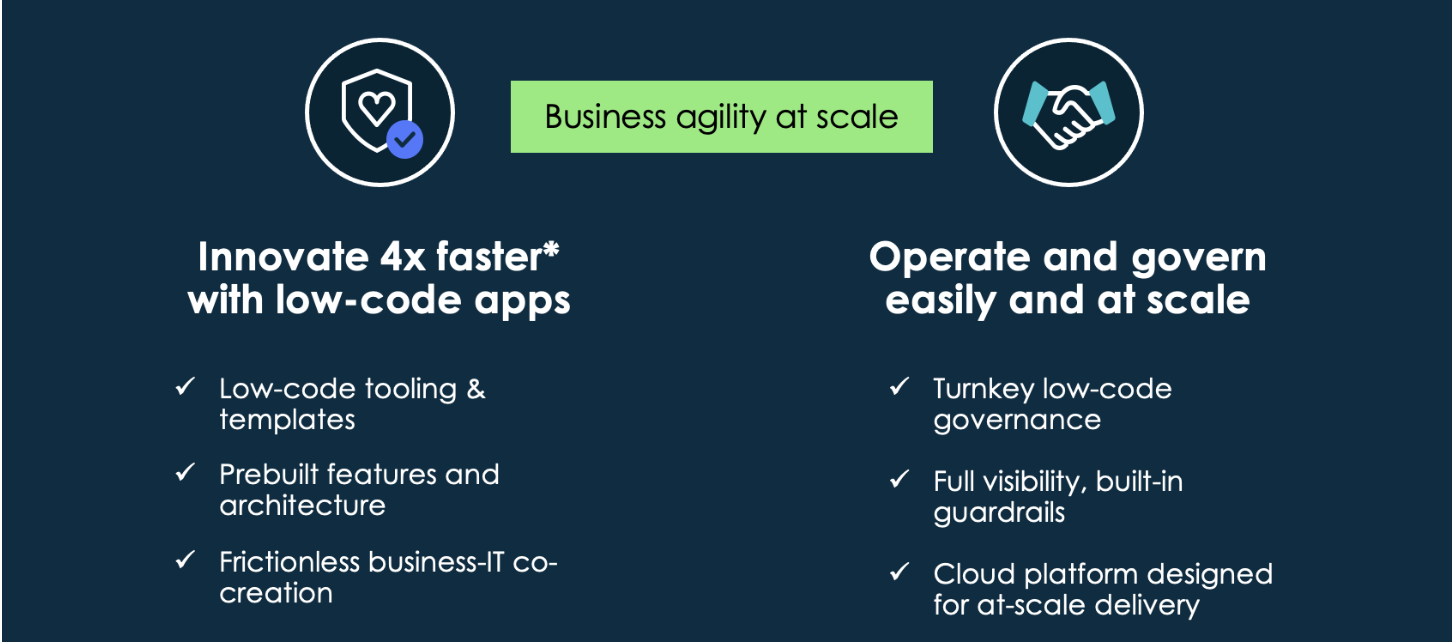App demand is greater than the ability to develop
Many organizations are struggling to fully benefit from digital transformation due to the pressure on their IT teams and the isolated approach to app development. As a result, businesses are reevaluating their operational models. Since 2019, low-code platforms have become increasingly popular as the demand for apps surged, as well as to accommodate remote employees during the COVID-19 pandemic.
This increased demand for apps occurred at a time when there was a shortage of technical talent. According to IDC, approximately 750 million digital apps will need to be developed between 2023 and 2025, yet finding the necessary technical expertise has never been more challenging. Even as far back as 2015, Gartner estimated that the demand for apps was growing five times faster than the capacity of IT teams to develop them. Additionally, IDC estimates that there will be a shortage of four million full-time developers by 2025. The trend towards remote work and the acceleration of hiring plans are expected to further exacerbate the scarcity of IT talent.

This shifted the app development paradigm to low-code
This growth is accelerating and has become a key differentiator. The adoption of low-code platforms has become a key differentiator for companies seeking to bridge the tech talent gap and accelerate digital transformation and legacy modernization. Traditionally, organizations had to hire professional developers or use off-the-shelf software to meet their application needs. However, low-code platforms allow less technical employees, who are closer to the business problems, to create the functionality needed to streamline processes. This democratization of app development has led to faster application development and deployment times, driving growth for businesses. According to Gartner, by 2025, 70% of new applications developed by enterprises will use low- or no-code technologies, a significant increase from less than 25% in 2020.

Low-code adoption challenges
While low-code platforms offer a solution to the tech talent shortage, they also come with challenges that can impact the quality of the apps developed. Inconsistent app experiences and redundancies of effort can arise if low-code development practices are not appropriately implemented. This can also lead to the growth of shadow IT and a lack of oversight. Simply applying reactive governance measures is not enough to address these issues. A proactive approach is needed to ensure the quality and effectiveness of the apps developed through low-code platforms. To fully realize the value of low-code, organizations should embrace an adaptive approach to governance that allows for the reuse of templates and best practices.
ServiceNow App Engine is the single, unifying platform to build with low-code and operate at scale
ServiceNow's platform enables a democratized approach to application development. By abstracting away the complexity of app development, ServiceNow allows developers to focus on creating and configuring apps using low-code. With our complete full-featured capabilities and out-of-the-box components, developers can build high-quality and domain-specific experiences that are proven to work.
Additionally, all apps are delivered on a single platform, which ensures enterprise standards and compliance through built-in governance capabilities. The result is more user-centric, easy to manage, and scalable apps that maximize business functionality.
- The ServiceNow platform provides one-platform simplicity with native workflow, integration, RPA, and intelligence capabilities.
- The ServiceNow platform environment is 4x more productive to build with low code tooling, templates, effortless collaboration, and pre-built components to remove friction at every step.
- The platform has built-in governance across a single open platform, architecture, and data model, ensuring enterprise standards and compliance.

What Capture offers to you with ServiceNow App Engine
- AUTOMATE manual processes
- MODERNIZE user experience without rewriting the architecture and applications
- REBUILD legacy applications in ServiceNow
Automate
Low-code deployment has a wide range of use cases, from simple to complex, but all share the ability to accelerate time to value for organizations with limited tech talent.
Low-code enables the automation and digitization of complex business processes across all industries, including new product introduction in technology, loan stipulation in banking, waste dispatch in manufacturing, e-discovery in legal, and even assisting in the construction of physical branch locations.
Modernize
One area where low-code has been particularly successful is in the modernization of legacy applications, especially those built on SAP or on legacy industry-specific core systems. Low-code apps are being built to automate AR, contract payment, and invoice, supply chain, and operational processes that are still running on legacy applications, helping organizations reduce their technical debt while streamlining back-end processes.
Rebuild
Legacy applications built with obscure technologies, un-integrated to the architecture, without documentation, support, or proper IT governance are a common nightmare for incumbent IT organizations. ServiceNow customers are able to extend the value of their current workflows by augmenting their existing automation with purpose-built low-code apps, rebuilding and replacing these legacy applications. For example, an app was built to augment employee workflows to capture ad hoc service requests, or a customer order fulfillment and service onboarding app was built to extend the value of the customer workflow solution.
Our experience
- 14 years of experience in pro-code application development (Java, Oracle PL/SQL, mobile, SAP, etc.) with a recent strategic shift towards low-code development
- A team of 20 senior developers and ServiceNow experts, including ServiceNow Certified Application Developers, and constantly growing
- Successfully served 10+ customers with application development, including E.ON, Erste, Groupama, Lufthansa Systems, GE Capital, and Mars
- Experienced in delivering projects ranging from 10K to 1M EUR, utilizing methodologies from traditional waterfall to agile scrum



